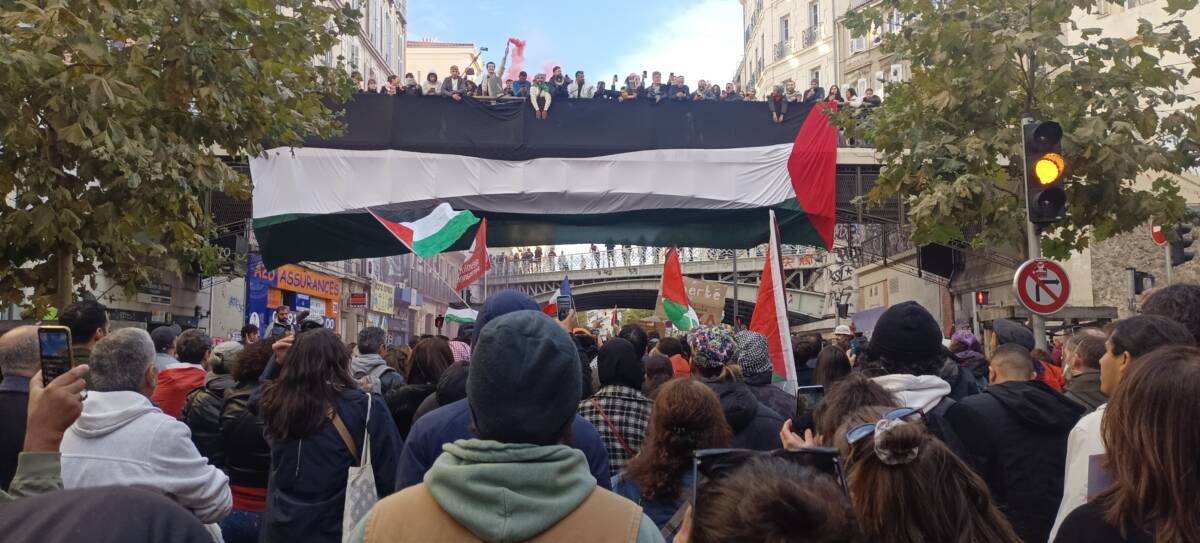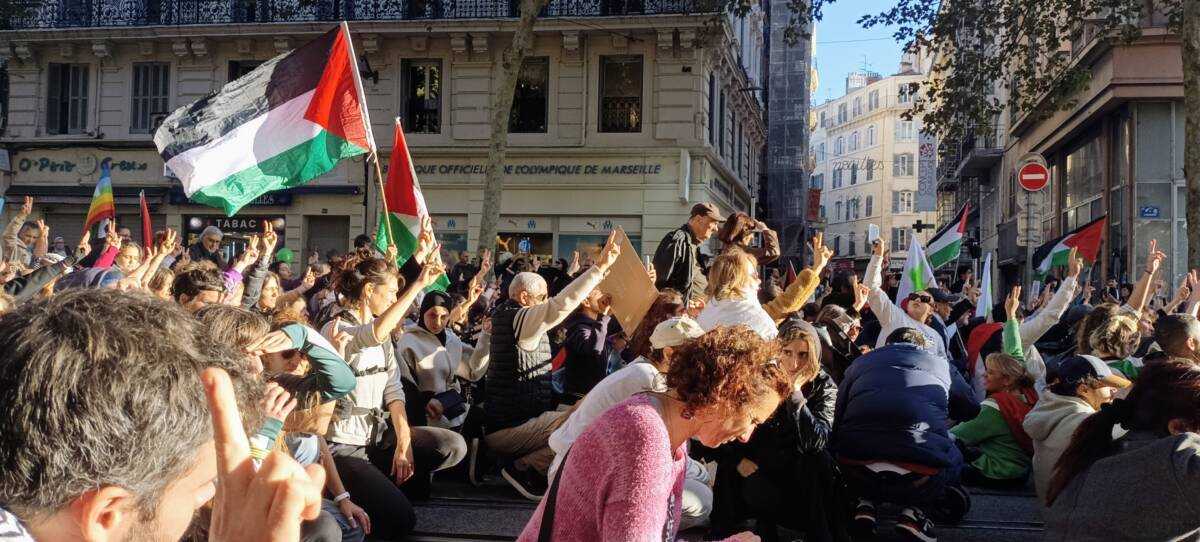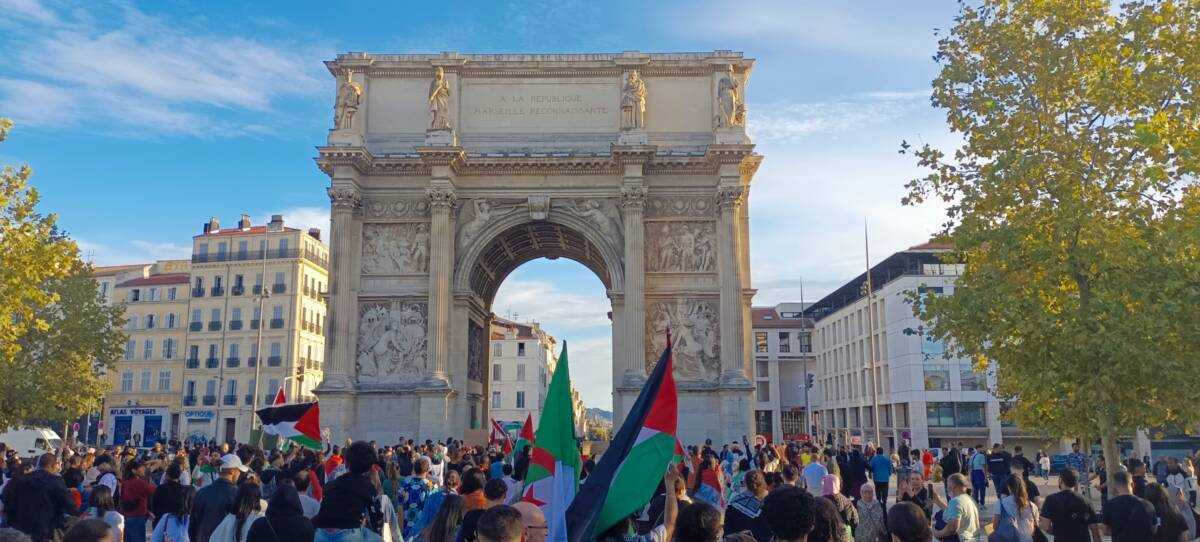Repression of Palestine solidarity leaves Syrians concerned for their future in Europe
For Syrians and Syrian-Palestinians, crackdowns on expressions of solidarity with Palestine have exposed a “double standard” in European democracies and reopened old wounds. As the political climate hardens, they fear their full participation in European society is increasingly at risk.
21 November 2023
MARSEILLE — “We didn’t do anything! We didn’t do anything!” Basela, a Syrian-Palestinian woman, cries. French police encircle her at a peaceful pro-Palestine gathering at the Old Port of Marseille on October 18, as protesters shout “Vive la Palestine!”
Basela, 55, screams as officers brusquely handcuff her and her sister, ripping a Palestinian flag they are holding out of their hands, in a video she shared with Syria Direct. Her cry was not out of fear or pain, she says, but an expression of “injustice, and the sentiment that I could not express myself, I could not speak…with all of the Palestinians trapped in Gaza.”
Basela, her sister and her 21-year-old daughter were detained for 24 hours, then released with 135-euro fines for attending an unauthorized protest. Her sister was also charged with assaulting a police officer, which is not apparent in the video.
In the wake of her arrest, as well as the deportation of 72-year-old Gazan activist Mariam Abudaqa shortly afterwards, Basela feels “freedom in France is finished—I don’t believe in it anymore.”
Basela, who asked to be identified only by her first name, first came to France in 2015, after fleeing Syria for Egypt. Before the recent Gaza demonstrations, she protested in support of abortion rights and the Yellow Vests movement, among others.
But this round of protests feels different. In France, like in Germany and the United Kingdom, protests against the latest war in Gaza have been met with unprecedented repression and pushback in recent weeks, as authorities conflate criticism of Israel—and at times expressions of Palestinian identity—with antisemitism.
For Syrians and Syrian-Palestinians, crackdowns on expressions of solidarity with Palestine have exposed a double standard and shattered perceptions of countries they fled to, expecting safety and a wider margin of political freedom. Instead, they have found certain forms of political participation put their very future in Europe at risk.
‘The same struggle’
It is no surprise that Syrians have been among the millions of people worldwide who have taken to the streets to express solidarity with Palestinians over the past several weeks, Robin Yassin-Kassab, a British-Syrian commentator and the author of several books on Syria, tells Syria Direct.
When Syrians look at Gaza, “their trauma is reopened and revived,” he explains.“We recognize that it’s the same process as happened in Homs and Aleppo and Eastern Ghouta.”
On October 7, Israel launched its latest war in Gaza, imposing a total siege on the Palestinian territory in response to Hamas attacks on Israeli military positions and civilian communities the same day. Some 1,200 Israelis were killed and around 240 taken hostage by Hamas. Since then, Israel has killed more than 13,000 Palestinians in Gaza—40 percent of them children—according to the Gaza Health Ministry.
Syrians see echoes of their own experiences in images and stories coming out of Gaza. The list of cities besieged and bombed during the war in Syria is long, and includes Yarmouk, a Palestinian refugee camp in Damascus that was besieged and bombed by Syrian government forces for more than two years.
Basela, who is originally from the Yarmouk camp, remembers how regime forces “attacked a mosque…and a UNICEF school sheltering Syrian families, like in Gaza,” during the siege.
Israel and the Syrian regime are both “destroy[ing] the civilian infrastructure. And the reason why they’re doing that is to drive the civilian population out of the area, to make the place unlivable for human beings,” Yassin-Kassab adds.
Since October 7, Israel has damaged or destroyed 45 percent of the residential units in Gaza and ordered the evacuation of 1.1 million people from northern to southern Gaza. Israeli Ministry of Intelligence documents leaked last month proposed “the evacuation of the civilian population from Gaza to Sinai” in Egypt.
Like Basela, Bayan* and Muna—Syrian-Palestinians living in Germany—have attended multiple solidarity protests in recent weeks. All three come from Yarmouk, and their families were displaced from historic Palestine in 1948, during what Palestinians call the Nakba, or catastrophe, when up to one million Palestinians were displaced and dispossessed of their homes with the creation of the state of Israel. Palestinian refugees and their descendants in Syria are stateless, and can only become Syrian citizens under extremely rare circumstances.
“We cannot be for a free Syria from Bashar al-Assad…while being silent about other crimes,” Bayan, 36, who lives in Berlin, says.
“People who believe in the Palestinian cause also believe in the freedom of the Syrian people, so we [Palestinian-Syrians] were among the first to stand with the Syrian revolution,” Muna, 45, who lives in Munich, adds.
Read more: From Idlib to Gaza: Syrians demonstrate in solidarity with Palestinians
These sentiments drive Syrians in Europe, with or without Palestinian descent, to take to the streets in spite of the significant repression of protests and other expressions of Palestinian solidarity. Inside Syria, hundreds of people in the country’s north and south have also demonstrated in solidarity with Gaza in recent weeks.
“The struggle for national liberation and the struggle for political self-determination is ultimately the same struggle,” Yassin-Kassab says.
 Protestors march through one of the main arteries of the city of Marseille, 11/11/2023 (Natacha Danon/Syria Direct)
Protestors march through one of the main arteries of the city of Marseille, 11/11/2023 (Natacha Danon/Syria Direct)
‘Repression beyond imagination’
Across Europe, protests in support of Israel and the return of hostages held by Hamas have been allowed and encouraged in recent weeks, while pro-Palestine protests have at times been banned and violently repressed in both Germany and France.
Adam Borie, a lawyer from the Syndicat des Avocats de France (SAF), which provides legal support to defend civil liberties across the country, describes this as a “double standard.”
In Germany, Muna feels the idea of a post-fascist democracy is a “dream [that has] turned out to be false, especially with freedom of expression.” She believes “there is a defect that is clear from the double standard” with regards to Israel, including in Western media coverage of the Gaza war.
The repression of protests by various security forces in Europe “naturally took me back to Syria,” Bayan says. She finds it “very triggering” to re-adopt “survival mechanisms” she used during the Syrian revolution to participate in protests in Berlin—such as “hiding my phone, my face, not telling anyone I’m going to a demonstration,” she adds. “The amount of repression is beyond imagination.”
“If [protestors] are wearing keffiyeh or if they are holding a sign or something, they would be charged or arrested,” Bayan adds. In Berlin, where she lives, people have been arrested for wearing the keffiyeh—the traditional Palestinian scarf—and raising the Palestinian flag. In France, people have been fined for wearing the keffiyeh.
But repression does not affect citizens and non-citizens in the same way. While Bayan, like Muna, has German citizenship, she says most Syrians are at risk because most do not yet have it. As a result, many “are afraid to even express their opinion,” including on social media, due to the risks that criticizing Israel’s actions in Gaza could pose for renewal of their residency or eventual naturalization.
However, new laws may mean not even citizens are immune. A draft law currently being evaluated by the German parliament would make naturalization “conditional on a commitment to Israel’s right to exist” and allow for revoking of citizenship if “convicted of an antisemitic crime.” In a context where anti-Zionism and antisemitism are increasingly conflated, merely criticizing the state of Israel could be deemed a crime.
Anti-Zionism is opposition to Zionism—a political ideology aimed at creating and supporting a Jewish state in what is today Israel. Jewish Voice for Peace, an anti-Zionist, left-wing Jewish organization in the United States, describes anti-Zionism as “standing against the creation of a nation-state with exclusive rights for Jews above others on the land” and supporting “liberation and justice for the Palestinian people, including their right to return.”
In the UK, Yassin-Kassab says “there’s been a deliberate attempt to criminalize support for Palestinians and opposition to Israel,” and “to identify antisemitism as criticism of Israel,” including critiques of “apartheid” and “genocide.”
Human rights organizations and experts, including at the United Nations, have described Israeli policies and occupation of Palestinian territory as a form of apartheid under international law. During the latest war in Gaza, 790 scholars and practitioners of international law have warned of a “potential genocide” in the besieged territory, while UN experts this week pointed to “evidence of increasing genocidal incitement.”
In the UK, protesters have been arrested under the Terrorism Act due to alleged antisemitic speech and banners—including the widespread phrase “from the river to the sea, Palestine will be free.” Then-Home Secretary Suella Braverman called pro-ceasefire demonstrations “hate marches” last month. The government is now seeking to broaden the definition of “non-violent extremism” in a way that would encompass organizations like Palestine Action, a group that seeks to shut down Israeli weapons factories in Britain.
In France, beyond the latest protests, participation in the Boycott, Divestment and Sanctions (BDS) movement has been prosecuted in recent years. BDS is a Palestinian-led, international campaign that seeks to increase pressure on Israel to comply with international law using non-violent methods.
In 2015, a handful of BDS activists in France were convicted of “incitement to discrimination” for handing out BDS leaflets. In 2020, the European Court for Human Rights found the conviction to be in violation of “freedom of expression” and called on European states to “stop the prosecution of peaceful activists.” In 2019, the German government banned the BDS movement as antisemitic.
Basela and her family have French citizenship. However, asylum seekers at an unauthorized protest—like the one she was arrested at—who do not have papers could be “detained and deported within 48 hours,” Borie of SAF says. Those with refugee status could in theory “receive a ban from French territory,” and even if not deported, the offense remains on their record and the French authorities could reject a residency or citizenship claim due to “disruption to public order,” Borie adds.
For Basela, the deportation of Gazan feminist activist Mariam Abudaqa shocked her more than her own detention. On November 8, Abudaqa was deported to Egypt after legally entering France in late September to participate in a series of conferences. The French Interior Minister argued that, while the activist’s lectures on Israel’s “colonization and apartheid” had been tolerated prior to the October 7 attack, they were now deemed inflammatory.
“They did not even allow her to exit the country normally. They threw her in a car and detained her,” Basela says. Abudaqa, like Basela, read this as “a condemnation by the government of the struggle of our people as a whole.” Her deportation order was challenged by the French Jewish Union for Peace.
Muna is not shocked by European moves to suppress speech critical of Israel. “Maybe it’s because we’re used to repression, maybe it’s because we’ve seen repression—maybe it’s because we are still trying and striving with all our might to be liberated from everything called oppression, from all forms of oppression,” she says.

Protesters raise their hands with peace signs in a moment of silence for thousands of lives lost in Palestine during a demonstration in Marseille, 5/11/2023 (Natacha Danon/Syria Direct)
‘Rollback of rights’
Beyond the pro-Palestine movement, increasing repression of protests, banning of civil society organizations, and new legislation are edging Germany, France, and the UK closer to authoritarianism, Yassin-Kassab and Borie say.
Borie explains that the government intentionally issues bans on the same day or even hours before protests so that there is no time to appeal. He has observed an increasing number of protest bans and fines since the 2018 Yellow Vests movement. “It’s been a dangerous deviation for several years,” he says.
On October 10, the French government overturned its national ban against pro-Palestine protests, after the Council of State deemed it unconstitutional. However, many cities in France continued to uphold bans over risks to “public order” and “antisemitic acts”—including in Marseille where Basela unknowingly attended an unauthorized gathering on October 18.
Borie warns that “little by little, we will live in a situation where it’s difficult, or unauthorized, to hold certain opinions. So there’s a real rollback of rights that is also unjustified since when we look at the history of protests in France [protesters] are less and less violent.” Despite this, the response of the security forces has grown increasingly heavy-handed—as the UN has noted with rising concern.
Borie, like Yassin-Kassab, sees links between increasing repression of environmental groups and the repression of other protest movements, including in support of Palestine.
Yassin-Kassab fears the UK is “edging into the early stages of fascism.” He says policing is becoming “heavy-handed” and protests are being criminalized. He also notes that “racism is coming from the whole political spectrum,” demanding that Muslim, Arab, and immigrant communities “disown terrorism or disown antisemitism.”
The current atmosphere in Europe has put Syrian civil society organizations—many of which are based in Europe or receive European funding—in a difficult position. Bayan, who is the founder of a Syrian NGO, asked not to be named in this report out of fear of retaliation. Her organization relies on German government funding.
Non-Syrian organizations active in or organizing around Palestine have had their funding suspended or been outright banned since October 7—including the Samidoun Network, which advocates for the rights of Palestinian prisoners. The organization’s coordinator, a Palestinian-Syrian refugee, was subsequently issued a deportation order.
Beyond crackdowns on organizations, the current political climate in Germany is “threatening the lives of Syrians,” Bayan says. “We see a rise, a systematic rise, in anti-Muslim, anti-Arab, anti-Palestinian racism in Germany,” she adds. She worries the “generalization” of allegations of antisemitism against Arabs and Muslims will “discourage them from being active in German politics.”
Freidrich Merz, the leader of the Christian Democratic Union, which is leading in the regional election polls, has stated “Germany cannot absorb any more refugees [from Gaza]. We have enough antisemitic young men in the country.” Another member of his party said “rapid naturalization must be stopped.”
On 20 October, in an interview with Der Spiegel, German Prime Minister Olaf Scholz said “we must finally deport on a large scale those who have no right to stay in Germany,” in response to a question by the magazine about “those in Germany who harbor hatred for Israel,” “many [of whom are] people with Arab roots.”
Last year, over 80 percent of all antisemitic crimes in Germany were committed by the extreme right.
“It’s going to make the task much harder for those who want to be engaged at the political level in the future. It’s going to require more work to prove themselves and more work to find their way in this political system,” Bayan adds.
Despite the risks, all three women have continued to mobilize and attend protests. “I am not afraid to speak the truth” because “my belief in my cause is strong,” Muna says. “One should not fall into a state of despair,” she adds, because “the pulse of the street is stronger.”
Basela plans to keep demonstrating, saying “if we weren’t afraid of Bashar, we’re going to be afraid now?”







